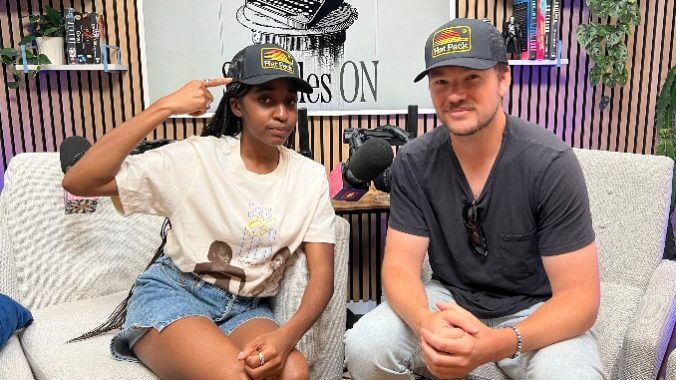Sean Clements Turns the Subtitles On During the WGA Strike
Photo courtesy of Subtitles On/The Flagrant Ones
For a decade, Sean Clements has had his knives out for Hollywood. He’s carved up the self-indulgent and egotistical personalities that populate showbiz alongside co-host Hayes Davenport on the podcast Hollywood Handbook. Both television writers, they put on buffoon personas of wannabe industry insiders. The satiric kabuki sometimes leaves the podcast’s own guests wondering “What just happened?” Their mimicry is done in intentionally contrived business and artistic vernacular that argues confidence and buzzwords are often a veneer for being completely full of shit.
The irony isn’t lost on Clements that for his new podcast Subtitles On, which is released on The Flagrant Ones’ Patreon feed, his gear shift to sincere discussion has turned him into one of the very things he’s skewered. Each episode dissects a film that addresses the profession of screenwriting, such as Barton Fink, State and Main, and Adaptation. His guests span the generational and professional gamut including: Broti Gupta (The Simpsons), Goldy Sharpe and Alec Sulkin (Family Guy), and David, A. Goodman (Golden Girls and co-chair of the WGA negotiating committee). Their conversations examine the depiction of screenwriters and often indulge in behind-the-scenes tales that include assuaging outraged celebrities and deploying a designated “truck conversationalist” to appease one particular star.
Paste spoke with Clements about the erosion of the writers’ room, loving Paul Thomas Anderson, and becoming his own punchline.
This interview has been edited and condensed for clarity.

Paste Magazine: Tell me about what brought you to start Subtitles On.
Sean Clements: It was partially inspired by the WGA strike, which caused there to be a larger conversation around writing, the state of the industry, and the way the studios and executives treat writers. It had my head turning around all that stuff and I had additional free time because we’re not working. I’ll give credit to the Blank Check guys. I was loving listening to their show. The Action Boyz, too.
I really enjoy talking about a movie point-by-point. I didn’t go to film school. I don’t have the background or breadth of knowledge about film that a lot of my peers do and so I have felt sometimes unqualified. Even though I enjoy talking about it, I always feel like the people I talk to know more than I do. But because it’s the writers’ strike, I have an access point that was seeing how writers are represented on screen and how it is or is not reflective of my own experience and the experience of my friends, and how it’s reflective of the time in which it was made versus the state of the industry right now. These are things that I’m hopefully more qualified to talk about and don’t feel like as much of a phony as I would to just say this movie is “good” or whatever.
Paste: You started writing on network shows right before the streaming boom. How has your job changed in that relatively short span of time?
Clements: One of the first shows I worked on was Alan Gregory, an animated show on Fox. People largely don’t remember it and it was viewed as an abject failure almost immediately. It wasn’t that long ago, like 12 years or something. Within, I would say four years, the viewership numbers we got on a show that was DOA would be considered a runaway success. The diminishment of audience size on network television was so precipitous. I don’t think I knew right away that was tied to streaming, but obviously it’s all related.
I just worked on a show for Netflix where I think the total viewership numbers would have been a massive success on network television at the time. I think the total number of people who will at least try a show on a streamer is huge. But because they have this unquenchable thirst for subscribers, content, and sustained viewership, that number is not considered a success now. So it does feel like I am constantly chasing this unattainable goal.
-

-

-

-

-

-

-

-

-

-

-

-

-

-

-

-

-

-

-

-

-

-

-

-

-

-

-

-

-

-

-

-

-

-

-

-

-

-

-

-








































